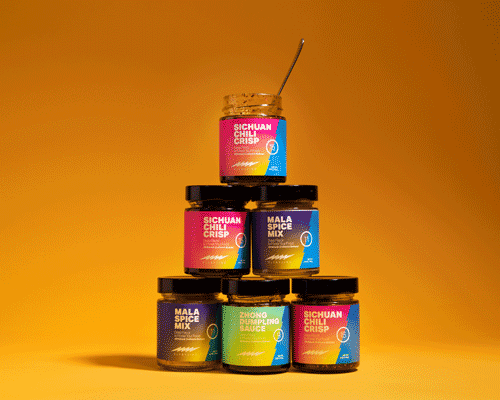This past summer, Tunde Wey, the Nigerian-born chef, writer, and activist, launched a direct-to-consumer salt brand. “Say hello to Lot, a premium sea salt for white people! No, seriously this isn’t a joke,” the brand’s how-it-works page reads. One box of Australian salt costs $100; the monthly subscription option is called “White Tears.”
It’s easy to get the reference for what Wey calls “pantry items as reparations”: start-up food brands are flooding Instagram, claiming disruption and redemption alongside eye-catching packaging. Naturally, there’s a lot to parody. With the flattening effect that marketing lingo can propel, it’s often challenging to distinguish walk from talk. Still, in the kitchen, where capitalism and culture uncomfortably overlap, there’s been a distinct shift in who’s selling our pantry staples, who benefits, and why we’re buying all that turmeric and tahini.
Before the pandemic, home cooks already had plenty of direct-to-consumer (DTC) options—for olive oils (Brightland, EXAU, Pineapple Collaborative, Wonder Valley); direct-trade spices (Burlap & Barrel, Curio Spice Co., Diaspora Co.); grains (Central Milling, Masienda, Yolélé); and ready-made seasonings and condiments (A Dozen Cousins, Basbaas Sauce, Brooklyn Delhi, Essie Spice, FLY BY JING, Loisa, Omsom). But more than ever, since COVID-19 has upended shopping, along with everything else, people have turned to the convenience of direct ordering. Buying online allowed people to avoid indoor spaces, stock up for a few months’ time, and abstain from supporting retailers that were coming under fire for insufficient worker protections and benefits. And for cooks with the luxury of staying home, as well as the financial security, it allowed something like the discovery of trying a dish at a restaurant, as more ambitious cooks—even those who’d been on a steady diet of takeout—sought out new recipes and took on cooking projects. Need that jar of za’atar for a Reem Kassis recipe? It’s just a click away.
Still, in the kitchen, where capitalism and culture uncomfortably overlap, there’s been a distinct shift in who’s selling our pantry staples, who benefits, and why we’re buying all that turmeric and tahini.
All of the brands I spoke with for this piece reported an unexpected springtime bump. Ethan Frisch, cofounder of the popular direct-trade spice company Burlap & Barrel, theorizes: “They bought all the beans and flour, and our biggest sales in the spring were cinnamon and bay leaves. Bay leaves for the beans and cinnamon for the banana bread?”
“March, April, and May are not traditionally big retail months, so we were not expecting high demand then,” says Ariel Pasternak, who cofounded Pineapple Collaborative, a brand that began as a virtual community for women in food. In December, Pineapple launched its all-women-produced The Apple Cider Vinegar in squat, wood-stoppered glass bottles and The Olive Oil in the buyer’s choice of peach, marigold, or white tins. “You might think, ‘Why do I have to pay for shipping when I’m already paying more for the product?’” Pasternak acknowledges of the bottles, which cost $20 and $34, respectively. “But this is your vote for having a business like Pineapple exist that isn’t just Amazon.”

“I think more than the pandemic, it was the civil rights movement that we’re in right now,” says Sana Javeri Kadri, who founded Diaspora Co., the self-declared queer, WOC-led direct-trade spice company, in 2016, with the mission to “decolonize the spice trade.” With the surge in support for the movement for Black lives and anti-racism more generally, she says, “people are waking up and starting to question where white people are asserting power across industries where maybe they shouldn’t be.”
In July, when Goya’s chief executive Robert Unanue spoke in support of President Donald Trump at a White House photo op, Loisa, a Latinx-owned company that sells sazón and adobo seasoning blends, along with rice and beans, saw a boost in shares on social media, including from Representative Alexandria Ocasio-Cortez to her 6.9 million followers on Instagram. And EXAU, an award-winning Calabrian olive oil by wife-and-husband team Skyler Mapes, who is Black, and Giuseppe Morisani, who is white, now has a waitlist for this year’s harvest, after its 2019 offerings appeared on lists of Black-owned food brands, including from the Food Network.
To some BIPOC-owned brands, the anti-racist boost has been, as Kirk Wardy puts it, “a bit of a double-edged sword.” Wardy started his South Carolina stone-ground grits company Southern Queen Foods in late 2019 as a passion project, sourcing corn from small farms and helping to reopen heritage mills in the process while selling over Instagram. Earlier this summer, Wardy opened his Instagram to so many DMs that he thought his account had been hacked. He realized that his grits were being shared as a Black-owned alternative to Geechie Boy Mill, a white-owned stone-ground grits company, after awareness grew that its name was capitalizing on appropriated Gullah Geechee culture.
For outsider pantry brands that seek to gain traction within the food-retail industry—which skews white and male—the DTC model has made business possible without huge amounts of capital or buy-in.
Wardy says he’s excited about the attention but feels wary of banking on the surge long term. “Sometimes I’m thinking, ‘Is this wave going to die out when this thing is over?’” Because the demand took Wardy by surprise, he is still building capacity; he says he wants to continue to grow slowly, in ways that will support customers while maintaining the freshest product possible. (When I spoke with Wardy one evening in late August, he said he was glad that he had only received ten orders that day—it had given him a moment to tend to other parts of the business.) While the initial explosion in sales has calmed down, Wardy says he’s gratified to see appreciation and demand for stone-ground heritage grits grow. “In the South, grits are an everyday thing. But to see people say, ‘These are the best grits I’ve ever had. What did you do?’ when they’re just plain grits, that’s something,” he says.
For outsider pantry brands that seek to gain traction within the food-retail industry—which skews white and male—the DTC model has made business possible without huge amounts of capital or buy-in. “It began from a personal mission to uncover layers of my own identity that grew into wanting to redefine some of the false narratives that exist about Chinese food,” says Jing Gao, the chef and writer who used Kickstarter to launch FLY BY JING in 2018.
Gao remembers attending Natural Products Expo West, an annual food trade show in Anaheim, California, as she was developing the idea for her Sichuan seasoning company. “It was shocking to me, after five days of walking around this massive show with thousands of brands, that I remember tasting maybe five products that were Asian in flavor,” she recalls. “And not only that, but that the people walking the halls—the buyers, the retailers, the brands—were all remarkably not diverse.” The experience motivated her to help change that and to base FLY BY JING in California.
“When the pandemic started, I was quite uncertain and quite scared,” says Gao, citing xenophobia and anti-Chinese racism. “It was reassuring to me to see our sales increase [and] to know that people had actually started turning to this Chinese condiment, rather than away from it.”

Mapes says the DTC model was EXAU’s ticket past sexist and racist gatekeepers in the California olive oil industry, which she describes as “not built for Black women.” Originally, she and Morisani, a white Italian man, had intended to focus mostly on wholesale and restaurants. “I know exactly who I can call right now in California and who will take my call, and who will take my husband’s calls, so I said screw this,” says Mapes.
EXAU’s bottle design is a modern take on classic Italian olive oil bottles, deliberately not meant to scream “millennial.” And Burlap & Barrel, which is white-owned, has purposefully downplayed its visual branding, focusing instead on agricultural and sourcing images, says Frisch. Earlier this year, Wey and Burlap & Barrel announced a collaboration, FK.N.STL iru (think Nestle), grown by women producers in Kwara in Nigeria, in its no-nonsense glass jars. (Wey considers iru “a victim of Neo Colonialism” and Nestle a big part of that colonialism.) On the label, “IRU” is announced in all-caps bold, while Burlap & Barrel’s name is barely visible. The company is exploring more collaborations to use Burlap’s growing customer base “to promote other products and companies who [don’t] have that platform,” Frisch says.
For other pantry brands, persona-driven packaging is a powerful communication tool. Gao developed FLY BY JING’s original neon-dazzling design to “stop [people] in their tracks and ask themselves why they expected something different from a Chinese chili sauce.” And Brightland’s founder, Aishwarya Iyer, says the brand’s eye-catching opaque white bottles with colorful designs are informed by her identity as an Indian American woman—and are a deliberate answer to the white California–minimal look of muted neutrals. “It’s just my heritage and how I grew up,” she says. “I have this fearlessness around color.”
Kadri jokes that Diaspora Co. has all been a ploy to incorporate her all-time favorite colors, yellow and pink, into her job, and describes the DTC model as “a storytelling medium.” In August, Diaspora Co. revealed its packaging—bearing the slogan BUILDING A BETTER SPICE TRADE! in botanically decorated block lettering—for its trio of single-origin turmeric, black pepper, and chili on Instagram, to a swooning comments section.
Home cooks who seek out delicious, sustainably grown pantry items from marginalized producers on farms with fair labor practices are, in some sense, paying to be comforted.
“I also have to check my privilege,” says Kadri. “A lot of the time, people doing the most interesting real work don’t have the ability to hire the graphic designer or have the visual arts degree to make [the work] accessible. I’m aware of that, and it therefore makes me wary of brands like mine that are overly cute and fun and sexy and all branding.”
The notion that social change can be enacted by buying high-quality, visually pleasing things is certainly seductive. Home cooks who seek out delicious, sustainably grown pantry items from marginalized producers on farms with fair labor practices are, in some sense, paying to be comforted. As Hilton Als wrote recently in the New Yorker, “These days, woke makes money.” We want to believe in what Wey calls “aesthetic politics” and gush over the bright-hued stories because it makes us feel like not just better cooks but better people, too.
DTC shopping provides us some degree of choice and control—far more than we have in the grocery aisle—over how we wish to participate in the food system, and over what kinds of cultural communities and futures we wish to support. Maybe what home cooks should strive for is not ethical consumerism or conscious consumerism or sustainable consumerism (an oxymoron, especially given all that shipping) but critical consumerism. Finding a less comfortable, more skeptical relationship to the ingredients we swear by is the only way that real pantry progress can be made.
For Kadri, a willingness to be uncomfortable and embrace complexity is key. “We get emails all the time from people being like, ‘How are you different from this other brand that also has a colorful Shopify site that talks about being direct trade?’” she says. Diaspora Co. works with small farms around India and, unusual for a spice trader, is in the process of providing health care to all partner farms—not, as she puts it, in a one-size-fits-all white-savior model, but tailored to the local context. “I didn’t want to hype our health-care efforts because, one, it’s a work in progress, and two, 45 women getting a full health check-up for the first time is not always joyous, but scary . . . But then I realize that when people ask about the equity angle, that’s an important piece to mention, in all its complexity.”
“Decolonization is everyday, constantly evolving, multilayered work,” she adds. “We’re constantly going to be in process.”